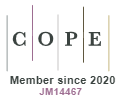Challenges and prospects for sorting and disposing of household solid waste: a case study of a recycling cooperative in Minas Gerais, Brazil
DOI:
https://doi.org/10.5585/2025.26076Keywords:
recycling, solid waste, recycling cooperatives, waste pickersAbstract
Introduction: This article discusses solid waste generation and the importance of waste picker organizations and cooperatives in Minas Gerais, Brazil.
Objective: From this perspective, the general aim of the research was to evaluate and propose improvements to the sorting and final disposal of household waste collected by a recycling cooperative.
Methodology: The study consisted of bibliographical research and field research. It was a quantitative, observational case study using a questionnaire for managers and cooperative members. The gravimetric composition observed in 2019 and 2020 and from January to July 2021 was obtained by consulting the cooperative's data.
Results: The results showed that there was an increase in the generation of household waste over the years analyzed. The results indicated that in 2019, the most extensive collections were of cardboard waste (290,987 kg), glass (172,760 kg), and white paper (128,582 kg), which accounted for 63.6% of the collection. The total collection during this period was 931,557 kg. In 2020, the largest collections were of cardboard waste (283,334 kg), glass (254,220 kg), and white paper (135,873 kg), which accounted for over 69% of the collection. The total collection during this period was 969,565 kg. From January to July 2021, the total collection was 527,632 kg.
Conclusion: The increase in waste generation over the years indicates the demand for an increase in the hiring of cooperative members responsible for sorting waste and implementing more robust environmental education programs to promote awareness of proper waste disposal practices.
Downloads
References
ABRELPE (Associação Brasileira de Empresas de Limpeza Pública e Resíduos Especiais). (2022). Panorama dos resíduos sólidos no Brasil. 1-14. Retrieved from: https://abrelpe.org.br/download-panorama-2022/
Instituto Pragma. (2022). Anuário Da Reciclagem. Retrieved from: https://uploads-ssl.webflow.com/609063d326f8d4cb6e852de0/63ac4964a8bd71442db83ded_Anu%C3%A1rio%20da%20Reciclagem%202022.pdf
Ribeiro, E. A., Moreira, K., Araújo, E. C. de, & Araújo, E. L. (2016). Condições De Trabalho Nas Cooperativas De Reciclagem Na Região De Maringá: Uma Análise Sob A Ótica Do Trabalho Decente. A Economia em Revista - AERE, 23(2), 91. https://doi.org/10.4025/aere.v23i2.24745
Bonini-Rocha, A. C., de Oliveira, R. A. C., Bashash, M., do Couto Machado, G., & Cruvinel, V. R. N. (2021). Prevalence of musculoskeletal disorders and risk factors in recyclable material waste pickers from the dump of the structural city in Brasília, Brazil. Waste Management (New York, N.Y.), 125, 98–102. https://doi.org/10.1016/j.wasman.2021.02.018
Bosi, A. de P. (2008). A organização capitalista do trabalho “informal”: o caso dos catadores de recicláveis. Revista Brasileira de Ciências Sociais, 23(67). https://doi.org/10.1590/s0102-69092008000200008
Botti Capellari, M., Colombo, A. L., & Saatkamp, B. S. (2024). Relação de Trabalho e Viabilidade da Cooperativa de Recicladores: Estudo de Caso da Cooperagir de Marechal Cndido Rondon/PR. Veredas Do Direito “Direito Ambiental e Desenvolvimento Sustentável’, 21, e212611. https://doi.org/10.18623/rvd.v20.2611
BRASIL. Lei n. 12.305, de 2 de agosto de 2010. Institui a política nacional de resíduos sólidos; altera a Lei 9.605, de 12 de fevereiro de 1998; e dá outras providências. Diário Oficial da União, Brasília, DF, 2 de agosto de 2010. Retrieved from: http://www.planalto.gov.br/ccivil_03/_ato2007-2010/2010/lei/l12305.htm
Duarte, M. C. L., Vieira, F. I. G., Braga, D. C. de A., Bastos, J. C. dos S. A., Perasoli, F. B., Silva, L. S. B., Rodrigues-das-Dôres, R. G., & Pinto, L. C. L. (2022). Socio-environmental and parasitological aspects of waste pickers in Minas Gerais, Brazil. Acta Scientiarum Health Sciences, 44, e56061. https://doi.org/10.4025/actascihealthsci.v44i1.56061
Esteves, R. A. (2015). A indústria do resíduo: perfil das cooperativas de reciclagem e dos catadores de resíduos no estado do Rio de Janeiro. Revista Monografias Ambientais, 14(2), 86–99. https://doi.org/10.5902/2236130817913
Fernandes, D. R. (2015). Uma Visão Sobre a Análise da Matriz SWOT como Ferramenta para Elaboração da Estratégia. Revista de Ciências Jurídicas e Empresariais, 13 (2), 57-68.https://edisciplinas.usp.br/pluginfile.php/5062085/mod_resource/content/2/Uma%20Vis%C3%A3o%20Sobre%20a%20An%C3%A1lise%20da%20Matriz%20SWOT%20720-2832-1-PB.pdf
Franco, G. M., Sigahi, T. F. A. C., Souza, R. D. S. de, & Saltorato, P. (2017). Comparando A Cultura Organizacional E A Autogestão Em Cooperativas De Reciclagem De Sorocaba E Região. Revista de Gestão e Organizações Cooperativas, 4(7), 115. https://doi.org/10.5902/2359043226706
Guabiroba, R. C. da S., Jacobi, P. R., Besen, G. R., Abegão, L. H. (2023). Sustainability indicators applied to a local strategy context: Proposals to improve selective waste collection systems involving waste picker organizations. Cleaner Waste Systems, 5(100102), 100102. https://doi.org/10.1016/j.clwas.2023.100102
Guabiroba, R. C. S., Jacobi, P. R., Abegão, L. H. (2023). Avaliação da sustentabilidade em cooperativas de catadores: um caso no município de Volta Redonda/RJ. Revista Valore, (8), e-8087. https://revistavalore.emnuvens.com.br/valore/article/view/1358/0
Hidalgo-Crespo, J., Amaya-Rivas, J. L., Ribeiro, I., Soto, M., Riel, A., & Zwolinski, P. (2023). Informal waste pickers in guayaquil: Recycling rates, environmental benefits, main barriers, and troubles. Heliyon, 9(9), e19775. https://doi.org/10.1016/j.heliyon.2023.e19775
Lopes, R. N., Silva, A., Medeiros, B. E. (2020). Estudo de caso e análise SWOT de uma cooperativa de coleta de resíduos sólidos na cidade de Três Rios/RJ. Epitaya E-books, 1(12), 112-121. https://doi.org/10.47879/ed.ep.2020144p112
Instituto Brasileiro De Geografia E Estatística (IBGE). (2023). Censo Demografico 2022 https://ftp.ibge.gov.br/Censos/Censo_Demografico_2022/Previa_da_Populacao/POP2022_Municipios_20230622.pdf
International Solid Waste Association (ISWA). (2022). Retrieved from: https://www.iswa.org/
Magera, M. (2003). Os empresários do lixo: um paradoxo da modernidade. 2 ed. Campinas: Átomo.
Lino, F. A. M., Ismail, K. A. R., & Castañeda-Ayarza, J. A. (2023). Municipal solid waste treatment in Brazil: A comprehensive review. Energy Nexus, 100232, 100232. https://doi.org/10.1016/j.nexus.2023.100232
Marchi, C. M. D. F., & Santana, J. S. (2022). Catadores de materiais recicláveis: análise do perfil socioeconômico na cidade de Salvador, Bahia, Brasil. Interações (Campo Grande), 23(2), 413–422. https://doi.org/10.20435/inter.v23i2.3058
Martins, A. C. (2007). A Busca de proteção ao trabalho dos catadores de lixo recicláveis: análise da experiência do Instituto lixo e Cidadania em Curitiba, PR. [Master Dissertation, Universidade Estadual de Ponta Grossa]. http://tede2.uepg.br/jspui/handle/prefix/213
Martins Filho, J. B., Neves, R. A. das, Melo, T. F. de, Ferrão, G. D. E., & Pires, I. C. G. (2018). Análise SWOT Da Associação Dos Catadores De Materiais Recicláveis De Chapadinha - MA. Revista Gestão & Sustentabilidade Ambiental, 7(4), 134. https://doi.org/10.19177/rgsa.v7e42018134-157
Moreira, R. S. (2012). Análise situacional de cooperativas sociais: o caso da Cooperativa dos Amigos, Catadores e Recicladores de Resíduos Sólidos – Unirenda. Revista de Administração de Roraima - RARR, 2(2), 114–135. https://doi.org/10.18227/rarr.v2i2.1142
Pablos, N. P., Burnes, E. L. (2007). Bien recolectada pero mal tratada: el manejo municipal de la basura en ciudad Obregón Hermosilloy Nogales. Revista de Investigación Científica Estudios Sociales, 15 (3), 167-193. https://www.scielo.org.mx/scielo.php?script=sci_arttext&pid=S0188-45572007000200006
PAIVA, V. (2004). Las cooperativas de recuperadores y la gestión de residuos sólidos urbanos en el área metropolitana de Buenos Aires. Revista Theomai, 99. https://sud.hypotheses.org/496
Porto, M. F. de S., Juncá, D. C. de M., Gonçalves, R. de S., & Filhote, M. I. de F. (2004). Lixo, trabalho e saúde: um estudo de caso com catadores em um aterro metropolitano no Rio de Janeiro, Brasil. Cadernos de saude publica, 20(6), 1503–1514. https://doi.org/10.1590/s0102-311x2004000600007
Schmitt Figueiró, P., & Gisele Bessi, V. (2020). Sentido do Trabalho: a Percepção de Empreendedores Sociais de Cooperativas de Reciclagem. Revista Gestão & Conexões, 9(1), 50–72. https://doi.org/10.13071/regec.2317-5087.2020.9.1.27379.50-72
Ribeiro Siman, R., Yamane, L. H., de Lima Baldam, R., Pardinho Tackla, J., de Assis Lessa, S. F., & Mendonça de Britto, P. (2020). Governance tools: Improving the circular economy through the promotion of the economic sustainability of waste picker organizations. Waste Management (New York, N.Y.), 105, 148–169. https://doi.org/10.1016/j.wasman.2020.01.040
Silva, A. C. do N., Bernardes, R. S., Moraes, L. R. S., & Reis, J. D. P. dos. (2002). Criteria for definition of environmental contamination indicators related to solid waste from health care facilities: a proposal for evaluation. Cadernos de saude publica, 18(5), 1401–1409. https://doi.org/10.1590/S0102-311X2002000500033
Silva, E. L., Menezes, E. M. (2001). Metodologia da Pesquisa e Elaboração de Dissertação. 3 ed. Editora da UFSC.
Tabernero, C., Arenas, A., Briones, E. (2007). Experiência prévia e eficácia grupal percebida perante dilemas sociais. Psicologia, 21(1), 83-105. https://doi.org/10.17575/rpsicol.v21i1.358
Nogueira Zon, J. L., Jacobsen Leopoldino, C., Yamane, L. H., & Ribeiro Siman, R. (2020). Waste pickers organizations and municipal selective waste collection: Sustainability indicators. Waste Management (New York, N.Y.), 118, 219–231. https://doi.org/10.1016/j.wasman.2020.08.023
Downloads
Published
How to Cite
Issue
Section
License
Copyright (c) 2025 Marcella Villela Carvalho, Ellen Francine Rodrigues, Valdir Schalch, Murilo Daniel de Mello Innocentini, Lisandro Simão

This work is licensed under a Creative Commons Attribution-NonCommercial-ShareAlike 4.0 International License.
- Abstract 225
- Tradução 94
- Idioma original (Português (Brasil)) 62









